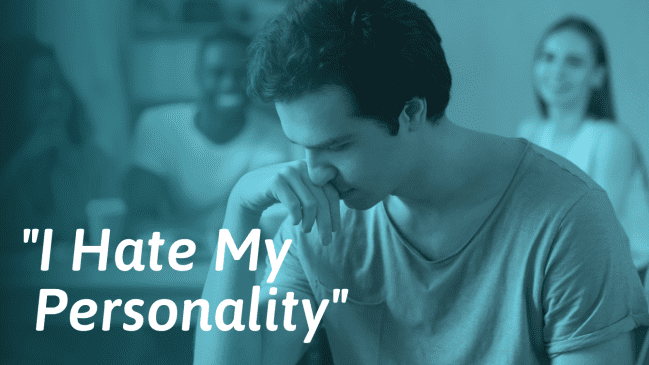“I hate my personality. I’m so weird around other people. I always talk too fast, and my words get jumbled up. I am awkward and strange. I feel like I’m always complaining. Why would anyone want to be around me?”
Does this sound like you? Sadly, many people dislike their personality. We tend to be our own worst critic. A lot of people tend to have an unbalanced way of thinking and think in all-or-nothing terms. For example, we will sometimes see things as all good or all bad. That means that we feel that our mistakes make us complete failures because we’re not a “success”.[1]
We also tend to see our feelings as facts. If we feel that there’s something deeply wrong with us, it must be true. But reality doesn’t work like that.
Of course, everyone has faults. I’m not saying you’re perfect. There’s probably a lot of things that you can improve on — that’s true for everyone!
Accept your personality to be able to change it
Hating yourself and your personality puts you in a horrible loop. When we spend our energy hating ourselves, we don’t have much energy to do other things, like develop our interests.
Carl Rogers (one of the founders of a client-centered approach in Psychology and psychotherapy) has said that “The curious paradox is that when I accept myself just as I am, then I can change.”
Learning to love and accept yourself for your faults can give you more energy to change said faults — not because you feel like you have to, but because you want the best for yourself. As we practice loving ourselves, we believe that we are worthy of being healthy and happy. As a result, we begin to make choices that support that state of being.
Reasons for hating one’s personality
People tend to hate their personality if they feel that there is something wrong with it. Sometimes we have someone in our life that makes us feel judged. It could be a parent who always expects us to achieve more or a friend who gives backhanded compliments.
Other times, we don’t know why we are so harsh on ourselves. Wherever the criticism comes from, it can be hard to deal with and even lead us to hate ourselves.
Growing up in an abusive or unsupportive family
When we grow up receiving negative messages about ourselves, we internalize and believe these messages. Hurtful words are especially harmful when we hear them during the first few years of our lives. That’s because those are the years we develop our beliefs about ourselves and the world.
For example, when we are toddlers, we develop our sense of autonomy.[2] You might not remember any particular negative messages you received. But a parent that does not let their young toddler experiment with making choices for themselves (for example, on what to wear) or let them take action (like help put things away) might unintentionally give a child a sense that they are not capable. Similarly, reacting with disgust or anger when a child makes a mistake (whether it is wetting themselves or accidentally breaking an object) can cause shame in the child.
Remember that it’s not just about receiving negative messages: a lack of positive reinforcement can be just as harmful. A child who never or rarely hears statements such as “I’m proud of you” can develop a negative sense of self. Similarly, not being given space to express all emotions can instill in a child a sense that they are “wrong”.
Bullying
Feeling that our peers dislike us can make us think something is wrong with us, especially if we don’t have a strong sense of self.
When a school bully points out our (real or imaginary) flaws, we might get the sense that everyone feels the same. The truth is, everyone has different preferences. Just like you don’t like everyone you meet, not everyone will like you. But that doesn’t mean that you’re an unlikeable person.
Depression
One symptom of depression is a critical inner voice that makes us feel worthless or like there is something wrong with us. Depression can leave you ruminating over every social interaction, judging yourself for the things you’ve said, and hating yourself for them. Or you might spend hours going over mistakes you’ve made in the past, feeling like it’s the end of the world, proof that you’re a horrible person.
Anxiety
Anxiety shares several symptoms with depression. If you have social anxiety, you might be so nervous around other people that you can’t think of what to say. Alternatively, you might ramble and lose track of what you’re saying. These behaviors can make you believe that your personality is the problem: that you’re boring or awkward, rather than just anxious.
Luckily, anxiety, like depression, is treatable. While it’s challenging to live with and can be debilitating, your anxiety doesn’t have to control you.
What to do if you hate your personality
Identify the exact things that bother you
What is it in your personality that bothers you? Do you worry that you are too uptight? Does your self-discipline need work? Perhaps you think that your sense of humor isn’t appropriate? Make a list of the specific things you dislike, and consider whether you can work on them.
Our personality isn’t set in stone, and many things change naturally over time. Working with a coach can help you identify which parts of your personality are bothering you and work on changing them or improving them, if necessary.
Read our tips on having a dry personality or having no personality.
See a therapist
While this might feel like it’s “proof” that there’s something wrong with you, that isn’t the case. A therapist can help you separate between facts and the stories that you’re telling yourself. In therapy, you can also improve skills like healthy communication and feeling comfortable around other people.
It can be challenging to find a good therapist. Sometimes, it takes more than several tries until we find someone we click with, who can give us the help we need.
We recommend BetterHelp for online therapy, since they offer unlimited messaging and a weekly session, and are cheaper than going to a therapist's office.
Their plans start at $64 per week. If you use this link, you get 20% off your first month at BetterHelp + a $50 coupon valid for any SocialSelf course: Click here to learn more about BetterHelp.
(To receive your $50 SocialSelf coupon, sign up with our link. Then, email BetterHelp’s order confirmation to us to receive your personal code. You can use this code for any of our courses.)
To make the process easier, read some guides on how to find a good therapist.
Attend a support group
Support groups can be a great addition to therapy and an excellent alternative to people who currently can’t attend or afford treatment. Support groups can make you feel heard and understood by people who are going through similar struggles.
You can find a free support group in your area or online, including Livewell (free online support groups for depression, led by volunteers), SMART recovery (a CBT-based model for recovery from addiction and other harmful behaviors), Refuge Recovery (a Buddhism and compassion-based model for healing) and ACA (a peer-led support group for people who grew up in an alcoholic, dysfunctional, or unsupportive home) – offer both in-person and online meetings).
Read books to increase your self-esteem and self-compassion
Books can be a great self-help resource. You can often find useful books at your local library or in second-hand shops. There are many books dedicated to the topic of self-compassion, including There Is Nothing Wrong with You: Going Beyond Self-Hate by Cheri Huber, Radical Acceptance: Embracing Your Life With the Heart of a Buddha by Tara Brach, and Self-Compassion: The Proven Power of Being Kind to Yourself by Kristin Neff.
See our ratings of the best self-esteem books.
Practice “metta” meditation
Metta, or “loving-kindness” meditation, helps us feel more warmth and compassion towards ourselves and others.
To do this practice, sit comfortably and close your eyes. Imagine seeing yourself in front of you. As you look at “yourself,” visualize saying to yourself: “May I be safe. May I be at peace. May I accept myself just as I am”.
In a typical “metta” practice, you send out these phrases to yourself for a while. Then, they imagine a loved one (a friend, mentor, or even a beloved pet) and then direct the phrases to them: “May you be safe. May you be at peace. May you accept yourself just as you are.” After a few minutes of directing these phrases at a loved one, you can do the same with someone you feel neutral towards (for example, someone you see occasionally but have never talked to) and then even a difficult person (someone you don’t get along with).
The intention of the phrases isn’t to make anything happen. Instead, we’re trying to connect to the positive feelings of wishing someone else well. You can use whatever sayings or wishes you feel comfortable with. Other popular ones include: May I be healthy. May I be free from danger.
Many people initially find it very difficult to send these loving feelings towards themselves. One tip is to imagine yourself as a small child. Another method is to start by sending these warm wishes to loved ones first. After you manage to connect to these positive emotions in your body, try to direct them towards yourself.
You can find many guided metta meditations for free on Youtube and meditation apps. This 10-minute guided metta meditation is a good one to try.
Develop new hobbies
When you spend your time doing things that excite you, you naturally improve your personality. As a bonus, you don’t have that much time left over to focus on hating yourself.
How do you develop new hobbies when you’re not interested in anything, though? Try different things until you find something that feels like it might work for you. Or you can read this article on what to do if you have no hobbies or interests. You might also get some inspiration from this list of hobby ideas.
Remember that it takes time to develop an interest. Often, we start a new project and assume that it isn’t for us if we’re not instantly passionate about it. But interest grows after commitment, instead of the other way around. Take something like Brazilian jiu-jitsu. You’re likely to feel awkward and out-of-place the first few times you try it. But if you go consistently for a few weeks, you’ll find yourself getting better.
Seeing your improvement is what makes it interesting! You’ll also get to know other “regulars.”
…
Give something a fair shot, but don’t force yourself if you feel that it really isn’t for you. The world is full of options – don’t let fear hold you back!














